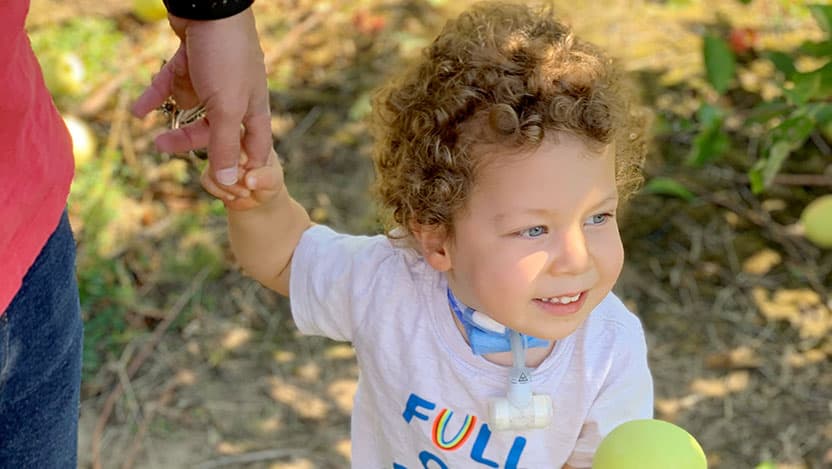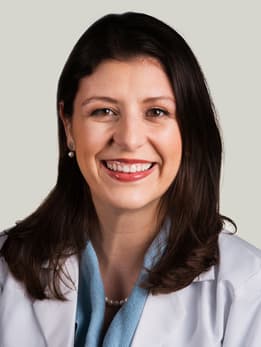Helping children with complex medical conditions thrive at home

Within the past few decades, advances in technology and care have led to increased survival rates for premature babies and those born with chronic conditions.
That, in turn, has led to an increase in children with medical complexity – children with intensive medical needs who are often dependent on technology, like ventilators, and who require home healthcare from skilled nurses such as RNs or LPNs, sometimes around the clock.
There are not enough home health nurses to meet the needs of these children. That’s a major fail point in supporting survivors of critical illness.
A shortage of home healthcare workers means these children spend more time in the hospital than needed, and when they go home, much of their care falls on parents and family members. That’s a problem that developmental and behavioral pediatrician Sarah Sobotka, MD, MSCP, has studied for years, and ultimately hopes to solve.
“When most people think about pediatric healthcare, they think about vaccines and well-child checks,” she said. “People often don’t think about children who were born at 24 weeks who go home with a ventilator and have a feeding tube for the rest of their early childhood. There are not enough home health nurses to meet the needs of these children. That’s a major fail point in supporting survivors of critical illness.”
Home nursing shortage leads to longer hospital stays

To understand the problem, Sobotka studies large databases, such as Medicaid claims, and conducts surveys and interviews with physicians, families, care coordinators, and home healthcare nurses.
The majority of children with ventilator dependence are survivors of prematurity who spend their first months in the hospital. While hospitals are essential in protecting the physical health of this vulnerable population, “they are terrible for development,” Sobotka said. That’s because children are separated from their families and often spend the majority of their time alone in a crib.
Getting these children out of the hospital is more difficult than simply setting up a ventilator at home; they need skilled assistance during the transition, and often require ongoing medical support. lack of home nursing often resulted in hospital readmission for children with medical technology dependence.
“Children are staying in the hospital for months waiting for home health nursing to become available,” she said. “We want to minimize their time in the hospital and maximize their time engaging with their primary caregivers so they can achieve developmental milestones.”
In her interviews with nurses, Sobotka has found that the shortage of home health nurses can be attributed to several factors, including low pay compared to nursing roles in hospitals, as well as lack of benefits and vacation time. Many nurses are not exposed to home health during school and therefore do not choose that area for a career, Sobotka said.
“Working in a family home can be challenging, but it can also be very gratifying,” Sobotka said. “There are a variety of factors leading to this shortage that can be addressed.”
We ask parents to fill this void of complex nursing care for their child with medical complexity, and they are exhausted.
Helping keep children in their homes
When children do finally come home, the home nursing shortage results in a kaleidoscope of caregivers. In a new study of Medicaid data, Sobotka and her co-authors found that while RNs and LPNs delivered most home healthcare for children with medical complexity, non-nursing providers – including home health aides, CNAs, and personal assistants – delivered substantial care.
“We ask parents to fill this void of complex nursing care for their child with medical complexity, and they are exhausted,” she said.
Sobotka has ideas of how to solve the shortage. Expose nursing students to home healthcare to encourage them to enter the field, for example, and train CNAs to help with tracheostomy changes and ventilator management. And those parents who are doing it all?
“We should train and pay parents to provide this care,” she said.
Sobotka sits on the medical advisory board of the University of Illinois Chicago’s Division of Specialized Care for Children, where she offers recommendations for supporting children with medical complexity. The board is highly supportive of the idea of paying parents in the same manner as other healthcare providers, she said.
“The majority of children only need a ventilator for a couple of years, and that is a sensitive time for development,” she said. “Anything we can help do to keep children in their homes will help them reach their development milestones.”
Sobotka and her colleagues have just published additional research on the topic of home healthcare utilization for medically complex children, with a focus on understanding the landscape in order to find solutions for the shortages in home health nursing. The paper was published on January 14 in the journal Pediatrics.

Sarah Sobotka, MD, MSCP
Sarah Sobotka, MD, MSCP, is a developmental and behavioral pediatrician. Dr. Sobotka's areas of expertise include developmental delays, disabilities and medical complexity in children.
Learn more about Dr. Sobotka